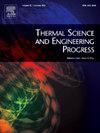Conditioning of synthesis gases from gasification for direct use in conventional burner systems
IF 5.1
3区 工程技术
Q2 ENERGY & FUELS
引用次数: 0
Abstract
This study demonstrates the potential of biogenic synthesis gases as a renewable alternative to natural gas for industrial process heat. The process chain integrates allothermal steam gasification using the Heatpipe Reformer, single-stage fixed-bed methanation, and direct combustion in a FLOX burner. Laboratory-scale experiments show that partial methanation increases the calorific value of the gas, doubling it, and reduces tar content to below 1 g/Nm3, facilitating cleaner gas utilization. FLOX burner tests with synthetic gas mixtures reveal that an increase in hydrogen content leads to higher NOx emissions, whereas a higher steam content mitigates this effectOver a continuous 72-hour operation, the burner consistently performed with syngas, maintaining stable operation. Emission measurements confirm that the system complies with regulatory limits, identifying biomass nitrogen as the primary source of NOx emissions. These results demonstrate that industrial heating processes can integrate biogenic synthesis gases without the need for an external hydrogen supply for gas conditioning.
求助全文
约1分钟内获得全文
求助全文
来源期刊

Thermal Science and Engineering Progress
Chemical Engineering-Fluid Flow and Transfer Processes
CiteScore
7.20
自引率
10.40%
发文量
327
审稿时长
41 days
期刊介绍:
Thermal Science and Engineering Progress (TSEP) publishes original, high-quality research articles that span activities ranging from fundamental scientific research and discussion of the more controversial thermodynamic theories, to developments in thermal engineering that are in many instances examples of the way scientists and engineers are addressing the challenges facing a growing population – smart cities and global warming – maximising thermodynamic efficiencies and minimising all heat losses. It is intended that these will be of current relevance and interest to industry, academia and other practitioners. It is evident that many specialised journals in thermal and, to some extent, in fluid disciplines tend to focus on topics that can be classified as fundamental in nature, or are ‘applied’ and near-market. Thermal Science and Engineering Progress will bridge the gap between these two areas, allowing authors to make an easy choice, should they or a journal editor feel that their papers are ‘out of scope’ when considering other journals. The range of topics covered by Thermal Science and Engineering Progress addresses the rapid rate of development being made in thermal transfer processes as they affect traditional fields, and important growth in the topical research areas of aerospace, thermal biological and medical systems, electronics and nano-technologies, renewable energy systems, food production (including agriculture), and the need to minimise man-made thermal impacts on climate change. Review articles on appropriate topics for TSEP are encouraged, although until TSEP is fully established, these will be limited in number. Before submitting such articles, please contact one of the Editors, or a member of the Editorial Advisory Board with an outline of your proposal and your expertise in the area of your review.
 求助内容:
求助内容: 应助结果提醒方式:
应助结果提醒方式:


